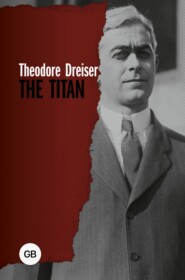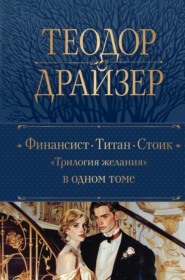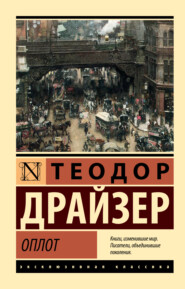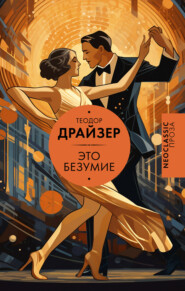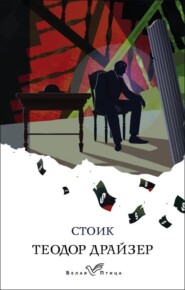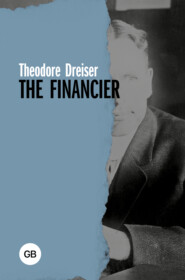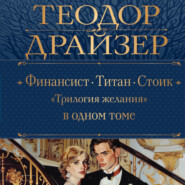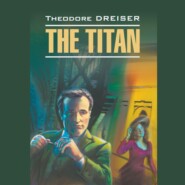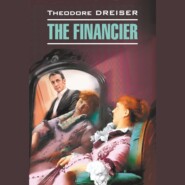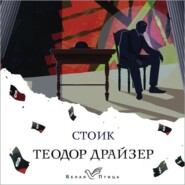По всем вопросам обращайтесь на: info@litportal.ru
(©) 2003-2025.
✖
The "Genius"
Настройки чтения
Размер шрифта
Высота строк
Поля
She turned her head away, leaving her rosy cheek near his lips. He kissed that, then her mouth and her neck. He held her chin and looked into her eyes.
"Be careful," she said, "mamma may come in."
"Hang mamma!" he laughed.
"She'll hang you if she sees you. Mamma would never suspect me of anything like this."
"That shows how little mamma knows of her Christina," he answered.
"She knows enough at that," she confessed gaily. "Oh, if we were only up in the mountains now," she added.
"What mountains," he inquired curiously.
"The Blue Ridge. We have a bungalow up at Florizel. You must come up when we go there next summer."
"Will mamma be there?" he asked.
"And papa," she laughed.
"And I suppose Cousin Annie."
"No, brother George will be."
"Nix for the bungalow," he replied, using a slang word that had become immensely popular.
"Oh, but I know all the country round there. There are some lovely walks and drives." She said this archly, naïvely, suggestively, her bright face lit with an intelligence that seemed perfection.
"Well – such being the case!" he smiled, "and meanwhile – "
"Oh, meanwhile you just have to wait. You see how things are." She nodded her head towards an inside room where Mrs. Channing was lying down with a slight headache. "Mamma doesn't leave me very often."
Eugene did not know exactly how to take Christina. He had never encountered this attitude before. Her directness, in connection with so much talent, such real ability, rather took him by surprise. He did not expect it – did not think she would confess affection for him; did not know just what she meant by speaking in the way she did of the bungalow and Florizel. He was flattered, raised in his own self-esteem. If such a beautiful, talented creature as this could confess her love for him, what a personage he must be. And she was thinking of freer conditions – just what?
He did not want to press the matter too closely then and she was not anxious to have him do so – she preferred to be enigmatic. But there was a light of affection and admiration in her eye which made him very proud and happy with things just as they were.
As she said, there was little chance for love-making under conditions then existing. Her mother was with her most of the time. Christina invited Eugene to come and hear her sing at the Philharmonic Concerts; so once in a great ball-room at the Waldorf-Astoria and again in the imposing auditorium of Carnegie Hall and a third time in the splendid auditorium of the Arion Society, he had the pleasure of seeing her walk briskly to the footlights, the great orchestra waiting, the audience expectant, herself arch, assured – almost defiant, he thought, and so beautiful. When the great house thundered its applause he was basking in one delicious memory of her.
"Last night she had her arms about my neck. Tonight when I call and we are alone she will kiss me. That beautiful, distinguished creature standing there bowing and smiling loves me and no one else. If I were to ask her she would marry me – if I were in a position and had the means."
"If I were in a position – " that thought cut him, for he knew that he was not. He could not marry her. In reality she would not have him knowing how little he made – or would she? He wondered.
CHAPTER XXIII
Towards the end of spring Eugene concluded he would rather go up in the mountains near Christina's bungalow this summer, than back to see Angela. The memory of that precious creature was, under the stress and excitement of metropolitan life, becoming a little tarnished. His recollections of her were as delightful as ever, as redolent of beauty, but he was beginning to wonder. The smart crowd in New York was composed of a different type. Angela was sweet and lovely, but would she fit in?
Meanwhile Miriam Finch with her subtle eclecticism continued her education of Eugene. She was as good as a school. He would sit and listen to her descriptions of plays, her appreciation of books, her summing up of current philosophies, and he would almost feel himself growing. She knew so many people, could tell him where to go to see just such and such an important thing. All the startling personalities, the worth while preachers, the new actors, somehow she knew all about them.
"Now, Eugene," she would exclaim on seeing him, "you positively must go and see Haydon Boyd in 'The Signet,'" or – "see Elmina Deming in her new dances," or – "look at the pictures of Winslow Homer that are being shown at Knoedler's."
She would explain with exactness why she wanted him to see them, what she thought they would do for him. She frankly confessed to him that she considered him a genius and always insisted on knowing what new thing he was doing. When any work of his appeared and she liked it she was swift to tell him. He almost felt as if he owned her room and herself, as if all that she was – her ideas, her friends, her experiences – belonged to him. He could go and draw on them by sitting at her feet or going with her somewhere. When spring came she liked to walk with him, to listen to his comments on nature and life.
"That's splendid!" she would exclaim. "Now, why don't you write that?" or "why don't you paint that?"
He showed her some of his poems once and she had made copies of them and pasted them in a book of what she called exceptional things. So he was coddled by her.
In another way Christina was equally nice. She was fond of telling Eugene how much she thought of him, how nice she thought he was. "You're so big and smarty," she said to him once, affectionately, pinioning his arms and looking into his eyes. "I like the way you part your hair, too! You're kind o' like an artist ought to be!"
"That's the way to spoil me," he replied. "Let me tell you how nice you are. Want to know how nice you are?"
"Uh-uh," she smiled, shaking her head to mean "no."
"Wait till we get to the mountains. I'll tell you." He sealed her lips with his, holding her until her breath was almost gone.
"Oh," she exclaimed; "you're terrible. You're like steel."
"And you're like a big red rose. Kiss me!"
From Christina he learned all about the musical world and musical personalities. He gained an insight into the different forms of music, operatic, symphonic, instrumental. He learned of the different forms of composition, the terminology, the mystery of the vocal cords, the methods of training. He learned of the jealousies within the profession, and what the best musical authorities thought of such and such composers, or singers. He learned how difficult it was to gain a place in the operatic world, how bitterly singers fought each other, how quick the public was to desert a fading star. Christina took it all so unconcernedly that he almost loved her for her courage. She was so wise and so good natured.
"You have to give up a lot of things to be a good artist," she said to Eugene one day. "You can't have the ordinary life, and art too."
"Just what do you mean, Chrissy?" he asked, petting her hand, for they were alone together.
"Why, you can't get married very well and have children, and you can't do much in a social way. Oh, I know they do get married, but sometimes I think it is a mistake. Most of the singers I know don't do so very well tied down by marriage."
"Don't you intend to get married?" asked Eugene curiously.
"I don't know," she replied, realizing what he was driving at. "I'd want to think about that. A woman artist is in a d – of a position anyway," using the letter d only to indicate the word "devil." "She has so many things to think about."
"For instance?"
"Oh, what people think and her family think, and I don't know what all. They ought to get a new sex for artists – like they have for worker bees."
Eugene smiled. He knew what she was driving at. But he did not know how long she had been debating the problem of her virginity as conflicting with her love of distinction in art. She was nearly sure she did not want to complicate her art life with marriage. She was almost positive that success on the operatic stage – particularly the great opportunity for the beginner abroad – was complicated with some liaison. Some escaped, but it was not many. She was wondering in her own mind whether she owed it to current morality to remain absolutely pure. It was assumed generally that girls should remain virtuous and marry, but this did not necessarily apply to her – should it apply to the artistic temperament? Her mother and her family troubled her. She was virtuous, but youth and desire had given her some bitter moments. And here was Eugene to emphasize it.
"It is a difficult problem," he said sympathetically, wondering what she would eventually do. He felt keenly that her attitude in regard to marriage affected his relationship to her. Was she wedded to her art at the expense of love?
"It's a big problem," she said and went to the piano to sing.
He half suspected for a little while after this that she might be contemplating some radical step – what, he did not care to say to himself, but he was intensely interested in her problem. This peculiar freedom of thought astonished him – broadened his horizon. He wondered what his sister Myrtle would think of a girl discussing marriage in this way – the to be or not to be of it – what Sylvia? He wondered if many girls did that. Most of the women he had known seemed to think more logically along these lines than he did. He remembered asking Ruby once whether she didn't think illicit love was wrong and hearing her reply, "No. Some people thought it was wrong, but that didn't make it so to her." Here was another girl with another theory.
They talked more of love, and he wondered why she wanted him to come up to Florizel in the summer. She could not be thinking – no, she was too conservative. He began to suspect, though, that she would not marry him – would not marry anyone at present. She merely wanted to be loved for awhile, no doubt.
May came and with it the end of Christina's concert work and voice study so far as New York was concerned. She had been in and out of the city all the winter – to Pittsburgh, Buffalo, Chicago, St. Paul and now after a winter's hard work retired to Hagerstown with her mother for a few weeks prior to leaving for Florizel.
"You ought to come down here," she wrote to Eugene early in June. "There is a sickle moon that shines in my garden and the roses are in bloom. Oh, the odors are so sweet, and the dew! Some of our windows open out level with the grass and I sing! I sing!! I sing!!!"
He had a notion to run down but restrained himself, for she told him that they were leaving in two weeks for the mountains. He had a set of drawings to complete for a magazine for which they were in a hurry. So he decided to wait till that was done.






